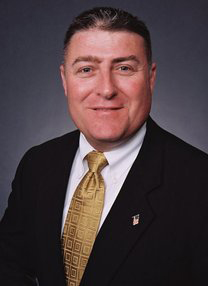Georgia Insurance Commissioner John F. King has been on the front lines during times of crisis for the United States for most of his career. A former Georgia police chief and current Major General in the U.S. Army National Guard, King has experience in emergency management, handling everything from natural catastrophes to top military operations.
King says the COVID-19 pandemic happening now is beyond the scope of anything he has seen before in his service, which includes deployments to both Iraq and Afghanistan. Response efforts to the pandemic are what he imagines the country must have gone through in mobilizing for World War II.
“This is the most unusual, most challenging event that I think I’ve faced,” King told Insurance Journal in an interview. “We’re responding to every state of our great union and [the military’s] never done that. We’re working with all FEMA regions.”
King is back on the front lines during this crisis, overseeing the construction of COVID-19 state medical facilities and temporary hospitals and facilitating bringing military medical practitioners from across the U.S. to help “relieve a very stressed medical system.” He has so far been in Louisiana helping New Orleans turn its convention center into a hospital and was in New Jersey last week. The goal is to alleviate pressure on the local hospitals. He also chairs Georgia’s Emergency Preparedness Committee started by Gov. Brian Kemp to respond to the pandemic.

“I think what we’ve been learning is that we have to become more efficient; we have to be very clear in our communications,” he said.
While away, King continues to oversee Georgia’s insurance market. Although he is not physically in Georgia now, he said he has been in constant communication with staff at the Georgia Department of Insurance as they work to educate consumers and ensure insurers clearly communicate with policyholders.
King was appointed by Kemp as insurance commissioner in 2019 after then-Commissioner Jim Beck voluntarily suspended himself from his elected position amid a criminal investigation. At the time, King was serving as chief of police in Doraville, Ga.
As he navigates this unprecedented crisis, King said the close network of state insurance commissioners, particularly in the Southeast, has been “incredibly helpful” in cutting through the red tape and helping him reach decision makers in the various areas he has been deployed. That has helped the military teams he oversees get to work in the regions as quickly as possible.
“In New Orleans, the first call that I made was the insurance commissioner. He told me who were the key decision makers, the director of emergency management, and we compared the authorities that the insurance commissioner of Louisiana has versus what I have in Georgia,” he said.
His role as insurance commissioner involves communicating not only with consumers, but also with insurance companies and that communication, he said, has been essential during this crisis. Companies have reached out to his department and others he has spoken with said they are all trying to work together with the industry to find solutions that help consumers during this time.
“A lot of people outside this industry think that insurance commissioners go and beat up on insurance companies. In Georgia, and with my colleagues in the Southeast, I didn’t get that feeling,” he said. “The insurance companies were calling us and asking us, ‘Hey, what can we do? This is unusual, we need to stabilize, we need to communicate clearly, because there’s a great deal of fear and a lot of misinformation.'”
He has been impressed with the marketing steps the industry has taken so far including issuing premium relief for auto insurance customers and offering flexibility to policyholders facing hardship. These moves show insurers are good corporate citizens, he said.
In addition, input from the insurance industry has been essential to the department as it weighs proposals and evaluates if any actions it plans to take are clearly understood.
King said he will be paying close attention to the controversial topic of business interruption and whether insurance policies cover losses from the shutdown. Because business shutdowns have come as a result of governors’ issuing stay at home orders, he said his interpretation is that these policyholders “should be covered in many respects.”
“We understand the root cause is going to be the pandemic, but they’re shutting down because of the orders from the governor,” he said. “We will address it if somebody files a complaint because they feel they should be covered – we will act on that and conduct a thorough investigation.”
The issue is not black and white, he said, despite many reports of no coverage.
“The people are obeying a lawful order under emergency circumstance from a governor. They’re going to get the protections from the insurance commissioner’s office,” he said.
Consumers across Georgia, he noted, are looking for help and the insurance department is one of the places they are turning to for information. At the same time, the insurance industry is also looking for guidance from the insurance department on how long the many emergency orders that have been implemented could last.
Among King’s emergency orders include: directing all P&C insurers to refrain from canceling any commercial policies, including business interruption or business income coverage, for the cause of non-payment for 60 days, or longer, starting March 20; suspended activities and functions that require in-person interaction, including all onsite exams, audits, and licensing requirements; temporarily suspending all non-federal filing deadlines are temporarily suspended and waiving applicable late filing fees; immediate and expedited review for products that are critical due to the COVID-19 outbreak or its effects; waiving CE requirements through April 30 and canceling insurance agent applicant testing.
The department is currently evaluating when these orders can be relaxed.
“The key now is how long can we sustain this pace,” he said. “We know that it is going to be very difficult to sustain the guidance and regulations that we published. They were intended to be for a short duration and under emergency conditions … we have to obviously support our consumers, but we can’t wreck the industry in the process.”
The crisis is far from over at this time he said, however, he won’t make any decisions that could cause more problems.
“When one part of the country starts relaxing there’s going to be this big push to try to get everybody else to, and that’s why we have to pay a lot of attention and work very closely with the governors to make sure that we’re not turning the faucet on prematurely or else we’re going to cause more damage than what we’re trying to fix,” he said.
The current crisis has opened his eyes to the true authority the office of insurance commissioner carries, King noted. Because it is an elected position in Georgia, King said he is accountable to the public but also understands that companies are “working really hard to work closely with us because we provide them the opportunity to do business in these tough times.”
“I’ve been very impressed with the fact that they’re all coming on board – they want to help,” he said.
Managing his multiple roles right now has been made easier thanks to his staff. “We’re doing remote operating, I just happen to be a little bit farther away than the rest of my team,” he said.
King, calling himself an optimist, said he isn’t worried about the long-term impact of the pandemic on the Georgia insurance market. The insurance industry, he said, has always underwritten innovation and this is another opportunity for it to do so.
“We will adapt; we will change the way we do business. We have survived worse, and I think we will come out of this completely on top of it. We just have to get through the initial shock of what we’re having to deal with,” he said. “But I never underestimate the ability of our great country and our great industry … this is just another challenge and this industry will thrive. I have incredible confidence that our industry will thrive.”
He encouraged the industry to continue communicating with state insurance departments, noting insurers are coming out with innovative ideas such as premium reductions that are being incorporated into the decisions of regulators.
“Every insurance commissioner that I know of is listening very carefully to the industry because we’re all in this together, and we’re all going to come out of this together, but we have to have a transition. We have to help our country survive this,” he said.
Hear the full interview:
Was this article valuable?
Here are more articles you may enjoy.


 California Chiropractor Sentenced to 54 Years for $150M Workers’ Comp Scheme
California Chiropractor Sentenced to 54 Years for $150M Workers’ Comp Scheme  Progressive Gains as Drivers Shop Around for Auto Insurance—Again
Progressive Gains as Drivers Shop Around for Auto Insurance—Again  Allstate Reports $731M in Q1 Pretax Catastrophe Losses
Allstate Reports $731M in Q1 Pretax Catastrophe Losses  North Carolina Adjuster and Son Charged With Embezzlement in Roof Jobs
North Carolina Adjuster and Son Charged With Embezzlement in Roof Jobs 

